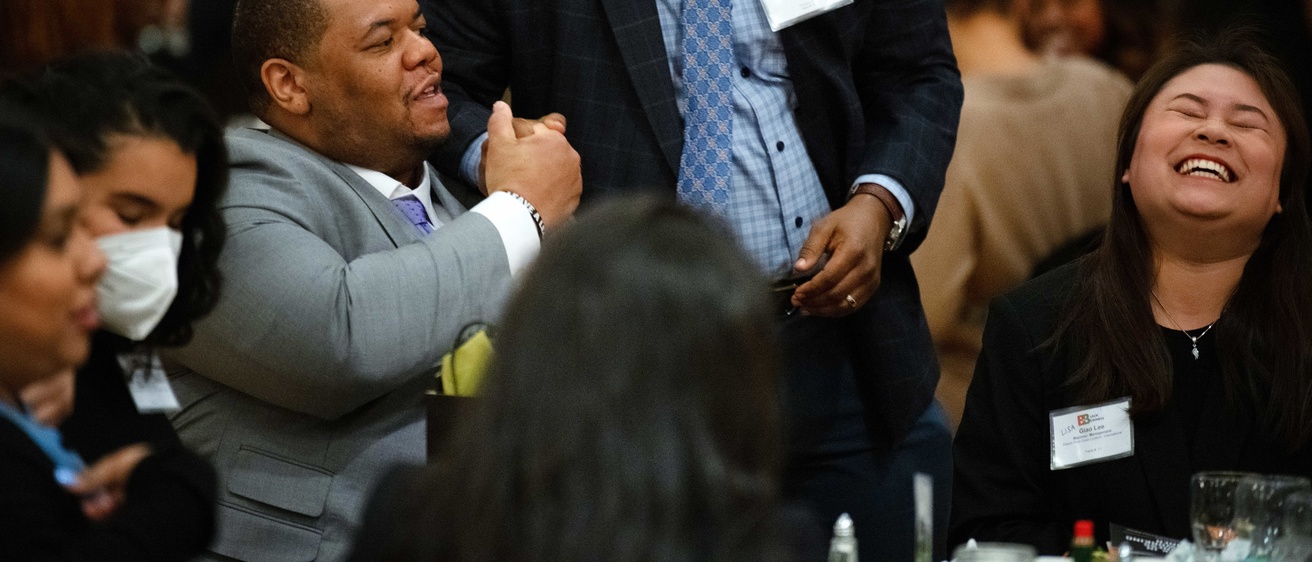
Breadcrumb
Developing learning communities to support BIPOC and international teaching assistants
New learning communities are fostering connection and knowledge sharing among Black, Indigenous, or People of Color (BIPOC) and international teaching assistants at Iowa.
Katherine Beydler, assistant director of the Office of Teaching, Learning, and Technology (OTLT) Center for Teaching, helped develop a partnership to build the communities through her network of graduate support professionals.
She connected with frequent collaborator, Jen Teitle, assistant dean for Graduate Development and Postdoctoral Affairs in the UI Graduate College, who suggested a learning community based on successful models at other institutions. They contacted partners in the College of Liberal Arts and Sciences, International Student and Scholar Services, and the English as a Second Language program.
Together, they launched two learning communities that focus on teaching as a BIPOC and/or International TA at the University of Iowa, a primarily white institution. Topics of discussion have included dealing with classroom microaggressions, language anxiety, and the hidden curriculum of academia.
“The Center for Teaching facilitates many peer-supported learning communities for instructors," explains Beydler. "We used that expertise to design opportunities for listening to and discussing graduate students’ concerns around teaching and interfacing with support staff, with the ultimate goal of addressing needs and identifying ongoing support.”
Beydler applied for funding from the Professional and Organizational Development (POD) Network in Higher Education, North America's largest educational development community dedicated to enhancing teaching and learning. After a competitive selection process, POD awarded her a diversity, equity, and inclusion (DEI) mini-grant, designed to support transformative efforts in DEI. The College of Liberal Arts and Sciences and International Student and Scholar Services also contributed funding.
Building community through connection
Beydler and Teitle volunteered as advisors, offering support and guidance.
“I had space not only to listen to and discuss my peers’ concerns with respect to teaching but also to be their partner and share knowledge stemming from my experiences,” says Joanne Constantin, a peer mentor for the communities. “Our advisors have shown wonderful commitment toward and support for our group. They have fostered an environment for success in being agents of change and bringing to life university-wide discussions and events.”
The new learning communities launched in fall 2021. After an application process, Sora Kim, College of Education, Ramin Roshandel, School of Music, Joanne Constantin, College of Public Health, and Hae Sun Kim, School of Music, were selected as peer leaders. Hae Sun Kim has since graduated with her PhD and joined the faculty at Iowa.
“I was able to feel connected to the international and BIPOC TA communities,” says Sora Kim. “This empowered me in that we arranged this safe space to share our stories and devote a joint effort to make our voices heard.”
Throughout the 2021–2022 academic year, the peer leaders organized and led two independent meetings for each community, one common meeting involving both communities, and a campus-wide panel event.
“The response from our fellow participants was absolutely positive,” says Roshandel. “The atmosphere has been supportive for us and them, and we all have been working in solidarity to make the whole space, classes in particular and the university in general, more open and beneficial for everybody.”
By fall 2022, the groups opted to meet as one. To date, they’ve organized an event with alumni speakers on the challenges of teaching at primarily white institution as a historically marginalized instructor, collaborated with the English as a Second Language program to develop new materials for international students’ orientation, and generated recommendations for Iowa faculty around supporting teaching assistants who experience identity-related microaggressions in the classrooms.
“I hope international and BIPOC TAs feel more supported than before,” says Sora Kim. “Our community agenda is to raise the consciousness of the concerns and needs of international/BIPOC TAs at Iowa. Our efforts will contribute to forming an inclusive campus climate.”
Looking to the future
Their immediate plans include increasing awareness of existing resources, building more opportunities for networking, and organizing an informational session this spring. But their goals for university-wide impact extend into the future.
“We hope that this community and sharing what we have achieved won't stop after we graduate and that this community will continue to be a safe space for TAs to share their experiences with their peers,” says Roshandel. “We also hope that what has been done will make class spaces more open in terms of the quality of the communication between students and their TAs.”
Their work will result in benefits to all Iowa students.
“I hope that the work being done will help community members leverage crucial inputs in the production of teaching services so that they are well-equipped and better positioned to implement their teaching philosophies,” states Constantin. “This is essential to building the healthiest, highest-quality student instructors to supply excellent teaching to Iowa students.”
Beydler presented about the learning communities at the Professional and Organizational Development Network in Higher Education annual conference in November 2022.